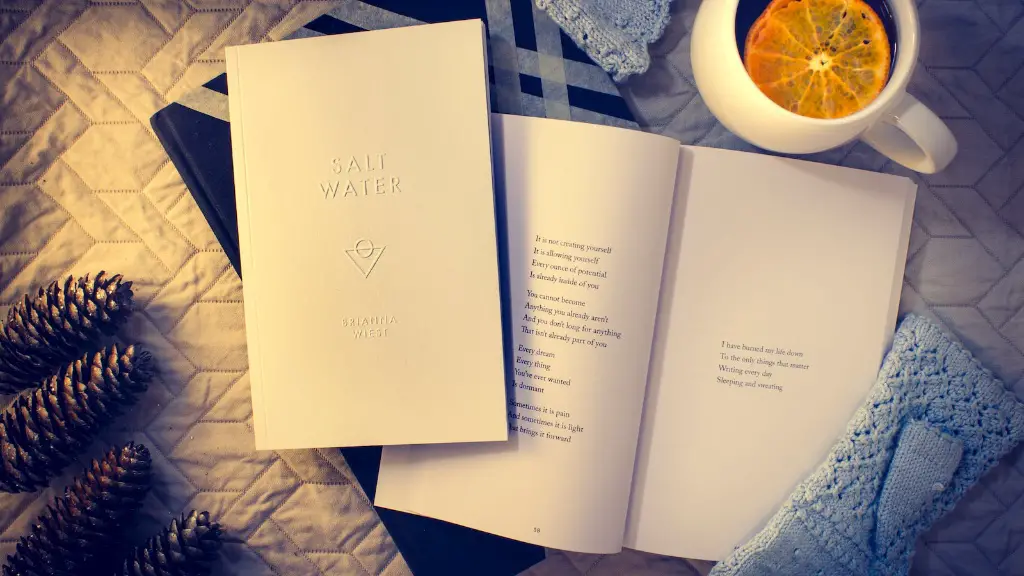How To Send Poetry To Magazines
The life of a poet is not always easy, especially when trying to get their work published in magazines. Although it may seem daunting, there are a few tips and tricks that any poet can follow to ensure their work is seen, considered and accepted.
The first step is to research which magazines are currently accepting submissions. Poets should be aware of their own style and genre, and so should make sure to look for magazines that align with their own. It is essential for poets to know the guidelines for submission, as most magazines will reject work which does not adhere to them – this will save poets time, money and effort in the long run.
Once any poet has found the right magazine and is familiar with the guidelines, it is imperative that the poet double-check the submission instructions with the magazine, even if the instructions are set out on their website. The poet should be aware that each magazine has a unique set of expectations, and it is therefore important that the poet is in line with those expectations before sending out any written works.
Perhaps the most crucial part for any poet is the work itself. Poets should ensure their work is of a high standard and is finalised; any typos can be a significant contributor in a potential rejection. As so much of poetry is emotive, it’s important that the poem or poems sent are of the finest quality and make the best impression. Aim to make the poem concise and meaningful, yet still creative and pushing boundaries.
Try not to put too much pressure on yourself, as it can actually detract from the creative process. Poets should take their time when editing their pieces, as the poem should never go out in its first draft. For most poets, this might be difficult, with the desire to get work out as soon as possible. However, sending out work when it is not to the highest standard can be damaging to the writer and the publisher. It is essential to get feedback as well as critique from trusted advisors, such as professors, writing groups and fellow poets, to help perfect the written piece. A well-crafted poem should be seen and acknowledged for its brilliance, an attribute that should be sought after by any poet.
Once the poet has revised the poem to a mere perfection, the next step is to package the poem for submission. It is wise to include a tailored covering letter to the magazine. It should be succinct and contain all the essential information, such as the genre and form of the poem which is being submitted and a description of any anthologies, awards or other accolades of which the poet is a holder. As important as acknowledging any accolades, it is also important to highlight any specialised skills that the poet may have. This can be extremely beneficial as it allows the editor to get a better understanding of the poet and any added value they could bring to their magazine or publication.
Despite the plethora of advice given, the most important thing to remember is that it is perfectly normal to feel anxious when waiting for a response. However, if a rejection does come in, use it as constructive criticism and don’t be discouraged to try again. It is essential for poets to have patience and never lose sight of their dreams. Submitting work to different magazines is an integral part of getting noticed and accepted as a poet, and editing also helps to hone skills and turn a poem into a work of art.
The Power of Networking
When sending poetry to magazines, networking is a great way for poets to get their work noticed. This can involve building relationships with other poets and professionals in the publishing industry, allowing the writer to create a stronger platform and presence. Networking can be done both online and in-person, and it is important to remember that getting a poem accepted also takes a lot of hard work and dedication. For example, poets can use social media as a means to reach out to editors and other professionals, such as publishers or agents. As well as this, they could attend events or competitions to demonstrate their work and to get feedback. The poet should also be sure to keep track of who they have worked with and how their works have been received, as it is useful to have a record of successes.
Poets can also get involved in workshops, readings and open mics. This is like networking in the sense that it allows poets to showcase their work, build relationships and connect with potential publishers, editors or literary agents. This can all contribute to a poet’s success and also improve their confidence, as there is nothing more rewarding than having an audience to appreciate their work. Furthermore, poets should also consider the possibility of publishing their own collections, whether organised in chapbooks or through Print On Demand platforms. These are all great ways for poets to get their work noticed in the world of magazines.
Insightful Resources
In an ever-growing world of publishing, it is sometimes inevitable that poets may choose to self-publish their works. However, it is important to know the advantages and disadvantages of doing so, making sure that one has all the information to make the right decisions. So, where can poets find these resources?
The internet is one way to gain information, as there are a plethora of websites with reviews and critiques of literary magazines and publishing houses, such as Poets & Writers, Submittable and Duotrope. Furthermore, poets may consider signing up to writing organisations such as Poets & Writers, which offer a significant range of opportunities, from book reviews to competitions to even resources for young poets.
It is also worth considering the availability of advice from peers, professionals and professors. Having a mentor or advisor to look over one’s work and give advice on the publishing process is invaluable. This way, poets do not have to take as much risk when submitting their work, as they will have a professional to help guide them through the process.
Lastly, poets should make the best use of libraries and bookstores. Libraries are great for gaining insight into other poets and their works, as well as magazines. Meanwhile, bookstores are a great resource for poets to gain information on forthcoming trends in writing and magazines. By doing this, poets can stay up-to-date with what is expected from them when submitting their poetry.
The Popularity of Poetry Magazines
In the digital world of today, poems are becoming more and more popular in all forms of media, from social media platforms to magazines. This has caused an influx in the amount of poetry magazines available. For instance, The New Yorker and Poetry magazine are both recognised nationwide, whilst Ponder Review and Poetry Quarterly are two of the most popular contemporary independent magazines. As well as this, Platforms such as Instagram can be used to showcase poetry, allowing it to gain popularity, subsequently attracting both existing and aspiring poets.
When considering which magazines to target, it is important that poets do their research in order to gain as much information as possible. Subscription fees and submission deadlines should also be considered, as some magazines now offer free subscription fees, whilst others charge more for this. Furthermore, poets should also be aware of their payment and copyright policies, making sure that any publication rights are established prior to submitting the work.
It is also important for poets to ensure that the content of their poetry is in keeping with the magazine’s themes and topics and should reflect the poets’ own writing style. It is essential that the poem and any covering letter sent with it is personalised, as this will show the magazine that the poet is passionate about having their work published. After decisions have been made as to which magazines to target, the real challenge begins – submitting the work to the right place!
The Benefits of Submitting Poetry
At the end of the day, the advantages of submitting poetry to magazines come down to one thing – the ability to get one’s work seen. Submitting poetry to magazines gives poets a greater chance of publication, as well as helping their name to become more recognised in the literary industry. It also gives poets the opportunity to collaborate with magazines and writing platforms, providing potential growth and wider recognition. Publication also gives poets access to a larger audience, which can be beneficial when looking to secure a book deal or publishing contract.
Providing recognition and awards to poets is one of the most rewarding aspects as this gives poets an opportunity to validate their writing and show appreciation for their efforts. Having one’s work published by a magazine also allows the poet to become associated with a well-known magazine, furthering their reputation and giving them a platform to showcase their work. This can be a great starting point for any poet, and it can opened up a new world of opportunities in the literary industry.
Tools, Tips and Strategies
When it comes to submitting poetry, it is important for poets to utilise the correct tactics. One way a poet can do this is by producing a portfolio of poetry for submission, which is usually better than submitting one single poem. This increases the chances of a poet’s poem being chosen, as the editors will have several poems to select from. As well as this, poets should also be aware of what type of poem the magazine is looking for. Taking time to read the magazine’s guidelines and having knowledge of the established style of the magazine can be beneficial in competitions, as it will make it easier to understand the expectations of the publication.
When it comes to understanding the relation between a poet and their magazine, it is important to learn to foster a good relationship with the editor or publisher. Questions such as ‘how often will I receive feedback?’ and ‘what are the payment terms?’ should be asked, as this will help poets to better understand the magazine and editors. They should also keep the lines of communication open with the team at the magazine and be respectful of any feedback given regarding their work.
It is also worth considering the option of submitting an article about a certain poet as an alternative to submitting a poem. This is particularly useful for poets who may have a limited number of accepted poems, as this could help to boost their recognition in the writing community and open doors to a variety of publishing opportunities. Poets should also benefit from partnering up with other poets, or even professionals in the industry. Partnerships are often beneficial as they can help to increase the chances of a poem being published, as it is likely that one of the two partners has a stronger personal connection with the magazine.
Submitting Poems: Pros and Cons
As with anything, submitting poetry comes with both advantages and disadvantages. On the one hand, the poet could be accepted and receive a significant payment for the poem. This could be such a great feeling and an achievement that gives the poet confidence to keep writing and sharing their work. On the other hand, it could be a tedious and time-consuming process with little to no gain. Or, the poet could be rejected, causing doubts about the poem and their own writing.
Furthermore, it can often take a long time to receive feedback from the publication. This can be disheartening when the poet has put in so much effort into crafting the poem and sending it to the magazine. Poets should remember to be patient and send the work out with realistic expectations. Additionally, it is worth bearing in mind that agents or magazines might not want to publish a poem, yet they may still offer constructive advice.
The key thing to remember is that no matter what happens, it is important to stay motivated and keep trying. Poets should also be aware that it is important not to give up on a poem too easily and be brave when submitting their work. It is also worth having a plan (for example, a ‘send and forget’ strategy) that allows the poet to keep motivated and remember their ultimate goal: to get their poem published!





